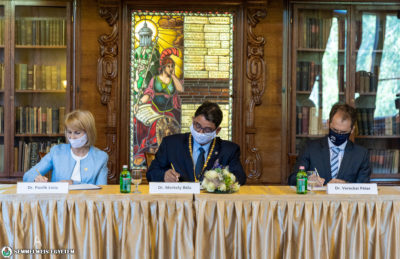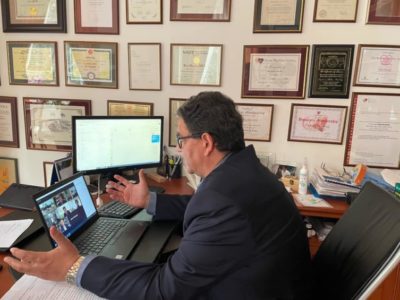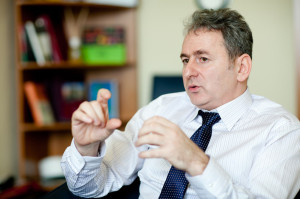 According to Dr. Marcel Pop, acting director of international relations at Semmelweis University, reciprocity and personal contact are the two most important components of a successful international cooperation. He emphasised that the process of internationalisation in higher education increasingly entails new tasks and responsibilities which influence Semmelweis University’s strategy as well. Consequently, the development of international relations is becoming more and more a priority in the fields of education, research and health care as well.
According to Dr. Marcel Pop, acting director of international relations at Semmelweis University, reciprocity and personal contact are the two most important components of a successful international cooperation. He emphasised that the process of internationalisation in higher education increasingly entails new tasks and responsibilities which influence Semmelweis University’s strategy as well. Consequently, the development of international relations is becoming more and more a priority in the fields of education, research and health care as well.
“Taking into account the importance of the subject, in the beginning of 2014 we conducted an analysis of the University’s international relations in terms of strengths and weaknesses lead by the Vice-Rector for Scientific Affairs, Dr. Mária Judit Molnár. We also involved the heads of the international relations departments at two other faculties (Dr. Tibor Kozsla – Faculty of Physical Education and Sport Sciences, Dr. Tamás Jakkel – Faculty of Health Sciences) as well as the directors of the Foreign Students’ Secretariat (Dr. Márk Kollai and Dr. Erzsébet Ligeti).” The conclusions of the analysis will serve as a basis for Semmelweis University’s leadership in developing the internationalization strategy.
[pullquote] Semmelweis University has a very good reputation worldwide which is also underscored by the fact that the University receives inquiries on international cooperation from all around the world[/pullquote]Dr. Marcel Pop emphasised that Semmelweis University has a very good reputation worldwide which is also underscored by the fact that the University receives inquiries on international cooperation from all around the world. One of the recent of such inquiries came from Bhutan since the Southeast-Asian country wishes to send students to our University.
The University maintains relations with over 200 institutions internationally. According to the 2013 summary on the University’s international relations created by the Directorate of International Relations the majority of these partnerships function in the framework of the Erasmus mobility programme; however, there are numerous bilateral relations that focus on student and staff exchange, joint research and development as well as scientific collaboration.
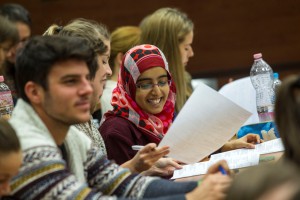 The University has an excellent international community thanks to the large number of international students; the University’s tradition and the outstanding staff provide a strong foundation for the development of international relations. According to the director, it is imperative that these relations become and remain active with reciprocity considered as a priority; in other words our students should go abroad as well as we should accept students from our international partner institutions. In addition, we also have to strive towards developing personal relations since it is worth more than any advertisement if our reputation is spread through positive personal experience.
The University has an excellent international community thanks to the large number of international students; the University’s tradition and the outstanding staff provide a strong foundation for the development of international relations. According to the director, it is imperative that these relations become and remain active with reciprocity considered as a priority; in other words our students should go abroad as well as we should accept students from our international partner institutions. In addition, we also have to strive towards developing personal relations since it is worth more than any advertisement if our reputation is spread through positive personal experience.
It is the task of the Directorate of International Relations to coordinate the European Union mobility programmes (Erasmus+, Campus Hungary, Leonardo etc.). Based on the above mentioned summary, the number of outgoing and incoming students has grown by ten per cent in the framework of the Erasmus mobility programme; the Directorate of International Relations ensured the participation of 129 outgoing students and 128 incoming students in 2013.
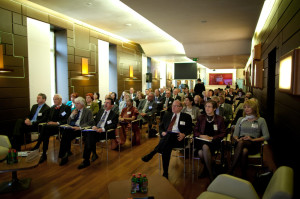 The Directorate of International Relations organised the official visits of numerous delegations in 2013. Semmelweis University’s efforts to strengthen relations with the University of Massachusetts and Rutgers University were among the more significant developments in the University’s international relations in 2013. In connection with the US, it is important to mention that the regional meeting of the American organisation, the AAHCI (Association of Academic Health Centers International) was organised by Semmelweis University’s Directorate of International Relations. The University has been a member of the organisation since 2012 and in light of the successful conference the parties are considering deepening the collaboration.
The Directorate of International Relations organised the official visits of numerous delegations in 2013. Semmelweis University’s efforts to strengthen relations with the University of Massachusetts and Rutgers University were among the more significant developments in the University’s international relations in 2013. In connection with the US, it is important to mention that the regional meeting of the American organisation, the AAHCI (Association of Academic Health Centers International) was organised by Semmelweis University’s Directorate of International Relations. The University has been a member of the organisation since 2012 and in light of the successful conference the parties are considering deepening the collaboration.
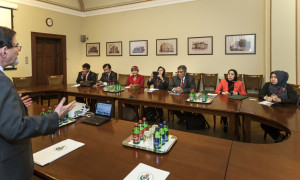 A Memorandum of Understanding was signed in 2013 between the Indonesian Padjadjaran University and Semmelweis University which provided an official framework for a more than two decades old bilateral cooperation. Several important steps were taken towards strengthening the over 30 years old Semmelweis-Heidelberg-Freiburg cooperation as well and currently there are considerable developments in the University’s institutional relations with Japan.
A Memorandum of Understanding was signed in 2013 between the Indonesian Padjadjaran University and Semmelweis University which provided an official framework for a more than two decades old bilateral cooperation. Several important steps were taken towards strengthening the over 30 years old Semmelweis-Heidelberg-Freiburg cooperation as well and currently there are considerable developments in the University’s institutional relations with Japan.
The University’s relations with the United Arab Emirates, Saudi Arabia and Kuwait strengthened due to the strategy of opening towards the East.
According to the Director, Semmelweis University’s relations with Central and Eastern European countries have also become stronger in the past two years as part of its international relations strategy. Numerous higher educational leaders participated in the above mentioned AAHCI conference. Additionally, Semmelweis University organises an international scientific conference – “Innovations in Medicine” – in cooperation with Akadémia Kiadó (Academic Pulbisher) in October 2014. “We hope that these conferences support our endeavours to become one of Central Europe’s the most influential centres of knowledge in the field of life sciences” – emphasised the director.
Dr. Marcel Pop told us that the Directorate contributed to several income generating programmes as well. This year for example over 50 Brazilian students came to our university – in contrast to last year’s 6 students – in the framework of the Brazilian government’s Science Without Borders programme. Similarly, Semmelweis University’s agreement with Gulf Medical University also generates income in the framework of which students from the United Arab Emirates participate in a summer training programme at Semmelweis University.
Pálma Dobozi
Translated by: Bonifac Makkai

